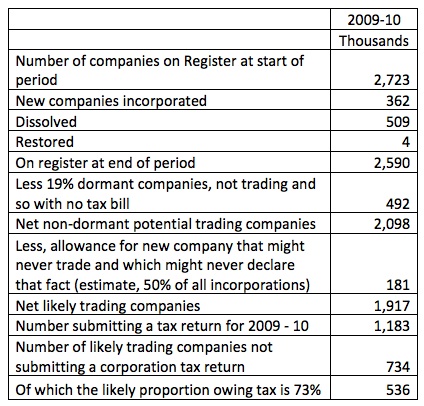H M Revenue & Customs will issue 850,000 penalty notices for late income tax returns this year. It sounds an astonishing number but actually about 8.8 million tax returns are filed a year (based on data here, page 9). That makes the error rate less than 10%, and given that many who receive penalties will never file, somewhat lower still.
This ratio, however, pales into insignificance when compared to that for corporation tax returns. I research this in 2009-10 tax year. The sources of all my data can be found here, all coming from official statistics, Companies House and parliamentary answers. What I prepared was the following table:

What I showed was that, near enough, there were likely to be 2.1 million companies (at a minimum) from whom it may have been reasonable to request corporation tax returns in that year and that since (again, I think generously) maybe 50% of all new companies will never trade and so will never have a tax bill that can in turn be downgraded to 1.9 million companies that could be liable to submit a return. The estimate turned out to be fair: based on data on page 48 of my report it's clear HMRC asked for returns from about 1,884,000 companies that year. Alternative data on page 46 suggest the figure may have been lower at 1,796,000.
What officially supplied data then confirmed was that just 1,183,000 tax returns were actually submitted.
However looked at that the inevitable conclusion was that some 600,000 returns were definitely not submitted. Compared to the estimates noted the number of reasonably expected returns not submitted exceeded 700,000.
What became clear was that although only 500,000 or so companies certified as dormant HMRC did not ask for tax returns form about 30% of all companies. And of those that were asked to submit returns only 66%, or thereabouts, did, at best. Overall, well under half of all companies in existence in the year submitted returns, an astonishing statistic.
Of those that filed tax returns the Revenue reports that about 915,000 paid tax . This is a ratio of about 73% paying tax. I used this ratio to suggest that of those not filing that ratio would owe tax. The government has quite extraordinarily claimed not filing a return means no tax was owed. I think that an absurd, and reckless, assumption, but that makes it consistent with so many they make when it comes to tax evasion. I estimated as a result that some £16 billion of tax may be lost as a result.
Now I stress, that's an extrapolation and an estimate: such figures can't be right but let's put the number in context. It cost just £66 million[i] to run Companies House in 2009-10 and about £4.4 billion to run H M Revenue & Customs in the same year[ii]. The losses in tax arising from failing to regulate companies might as a result exceed by a ratio of three to one, or more, the entire cost of running the departments meant to regulate their activities.
The consequences of regulatory failure for the UK economy are enormous, and one that the ordinary people of the UK are now bearing as a result of tax increases and service cuts when there should instead be many thousands of people employed by the government to crack down on abuse in the form of tax evasion through limited companies that the current ‘blind-eye' approach of both H M Revenue & Customs and the Department for Business, Innovation and Skills permits.
In the name of ‘cutting the burdens on business' successive governments have allowed an environment to develop in which fraud and criminality can thrive. It is time that an end was put to this abuse, in the interest of honest business and ordinary people.
And let's remember - when we consider the use of limited companies is intermediaries in what should be employment relationships, many of such companies will be amongst those not filing their accounts and tax returns. And that's another very good reason for concern.
Thanks for reading this post.
You can share this post on social media of your choice by clicking these icons:
You can subscribe to this blog's daily email here.
And if you would like to support this blog you can, here:


